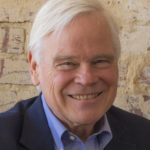Jane Borden’s new book “Cults Like Us: Why Cults Are As American As Apple Pie” has us thinking about cults. The Manson Family and Branch Davidians come to mind.
Borden, who grew up in Greensboro and graduated from UNC-Chapel Hill, is a proven writer. Her 2011 book about living and working in New York after college, “I Totally Meant to Do That,” showcased her gentle humor and writing skills.
Borden tells us that there are at least ten thousand cults in the U.S.
What then is a cult?
Borden, citing Robert Jay Lifton, a psychologist, explains that cults can be identified by three characteristics:
1: A charismatic leader who increasingly becomes an object of worship.
2: Coercive persuasion or thought reform.
3: Economic, sexual, and other exploitation of group members by the leader and the ruling coterie.
Borden asserts that cults have been a part of American life, beginning with the Pilgrims and Puritans.
“The Pilgrims’ and the Puritans’ cultlike ideology today manifest as commonplace secular belief. It is at the heart of American culture.”
She finds seven of their credos to be most pervasive and problematic and devotes a chapter to each:
Our innate desire for a strong man to fix our problems and punish those who disagree with us. The temptation to feel chosen, which justifies acting on our base desires. Our knee-jerk anti-authoritarianism and anti-intellectualism. Our impulse to buy and sell salvation on the open market. The belief that hard work is holy, while idleness is a sin. How quickly and easily we fall into us-versus-them thinking. An innate need for order which makes us vulnerable to anyone screaming, “chaos!” And then offering control.Borden fills the book with examples.
For instance, from the early days in America, sex within cults was often demanded by the leader. Borden writes:
“John Humphrey Noyes really wanted to bone his sisters. He claimed it would bring them closer to God. Noyes’s brother once quoted him as arguing that ‘the fellowship of brothers and sisters is fundamental and eternal’ because it concentrates the perfection of God’s people. By fellowship, he didn’t mean spaghetti dinners in the church basement. He argued God had started it, anyway, by inbreeding the ancient Jews into a perfect race.
Borden also writes:
“in 1869, 53 specially chosen women signed a pledge promising ‘that we do not belong to ourselves in any respect, but that we do belong first to God and second to Mr. Noyes.’
Over ten years 62 supposedly superior children were born. Noyes fathered 10 of the babies himself and another 19 were related to him.”
Borden explains how Noyes’ experiences related to the then growing eugenics movement.
“Ultimately, Noyes’s group was run out of town. They created a company called Oneida Community Ltd. Its successor. By 1983 it was selling more than half of the flatware sold in the U.S.”
Borden also writes about conspiracy theories.
“Cults and conspiracy theories are kissing cousins: they share DNA, often look alike, and sometimes get married. Our modern tendency to see and believe in conspiracy theories is actually a remnant of a handful of evolutionary advantages held by our forebears.”
In 1958, Robert Welch launched a right-wing political advocacy group called the John Birch Society. The most successful anti-communist organization in American history, its membership reached 100,000 people before shrinking in the late 60s. But it is still around today and claims personal responsibility for Trump’s 2016 election.
“The bulk of Trump’s campaign was Birch,” a former CEO of the organization told The Associated Press in 2024. “All he did was to bring it out into the open.” It’s worth noting that today’s John Birch society members also believe conspiracies about the Rothschilds, Davos, and the New World Order.
Then, with her irrepressible humor streak showing, Borden adds “last thing I’ll say about this group is that Welch also created Sugar Daddies, my favorite candy is a kid, which I only realized now has a wildly inappropriate name.”
Read this book and you will know more than most people about the underside of American history. And you will have the pleasure of reading one of America’s great young writers.
D.G. Martin, a lawyer, retired as UNC system vice president for public affairs in 1997. He hosted PBC-NC’s “North Carolina Bookwatch,” for more than 20 years.
Chapelboro.com does not charge subscription fees, and you can directly support our efforts in local journalism here. Want more of what you see on Chapelboro? Let us bring free local news and community information to you by signing up for our newsletter.
One on One: Cults and Apple Pie Chapelboro.com.
Hence then, the article about one on one cults and apple pie was published today ( ) and is available on chapelboro ( Middle East ) The editorial team at PressBee has edited and verified it, and it may have been modified, fully republished, or quoted. You can read and follow the updates of this news or article from its original source.
Read More Details
Finally We wish PressBee provided you with enough information of ( One on One: Cults and Apple Pie )
Also on site :
- My Dying Husband Has One Final Wish. I Don’t Think I Can Give Him That.
- Wynn Resorts faces second lawsuit after data breach incident involving employees
- Nancy Guthrie Update: Mexican Mothers Face Hurdles Joining Search

